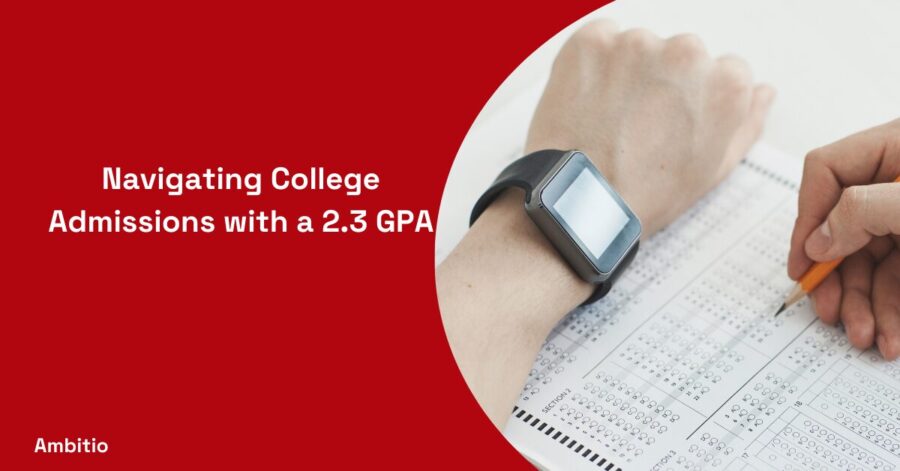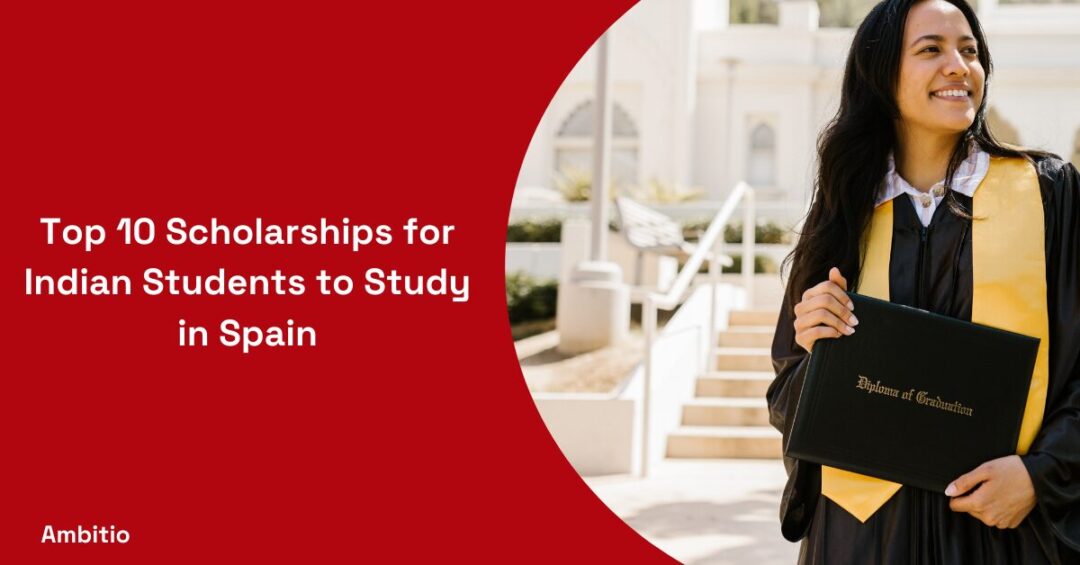13 December 2024
6 minutes read
Navigating College Admissions with a 2.3 GPA: Strategies and Options for Success

Introduction
Achieving success in college admissions with a 2.3 GPA might seem challenging, but it’s far from impossible. This comprehensive guide will explore colleges that accept a 2.3 GPA, delve into strategies to enhance your application and highlight alternative educational opportunities.
The Reality of a 2.3 GPA in College Admissions
A 2.3 GPA, considered below the national average, may initially appear as a hindrance in your college application journey. However, this GPA level doesn’t define your entire academic capability or potential for success. Many colleges understand that a student’s GPA is just one facet of their academic story.
This section will explore how a 2.3 GPA is perceived in the college admissions process and what it means for your applications.
Demystifying the 2.3 GPA: Understanding Its Place in Admissions
A GPA of 2.3 is typically viewed as low by most traditional four-year universities. However, it’s crucial to recognize that different schools have varying standards and holistic review processes.
This part of the blog will unpack the implications of having a 2.3 GPA and how colleges might interpret it in the context of your overall application.
The Holistic Review Process: More Than Just Numbers
Many colleges employ a holistic review process, considering factors beyond GPA, such as personal essays, extracurricular activities, letters of recommendation, and life experiences. This section will provide insight into how you can leverage these components to strengthen your application, despite a lower GPA.
Colleges and Universities That Welcome a 2.3 GPA
While a 2.3 GPA may limit options to some extent, numerous colleges and universities offer opportunities to students with this academic standing.
This section will provide a curated list of such institutions, along with insights into their admission processes and how they view GPAs in the context of the entire application.
- State Universities and Community Colleges: Many state universities and community colleges have more inclusive admissions policies, making them more accessible for students with lower GPAs. These institutions often provide a range of programs and can be a good stepping stone to four-year universities.
- Open Admission Schools: Some colleges operate on an open admission policy, which means they may accept any high school graduate or GED holder. Examples include certain community colleges and online universities.
- Private Liberal Arts Colleges: Some smaller, private liberal arts colleges are known for their holistic admissions processes. These institutions might place less emphasis on GPA and more on other aspects of a student’s application.
- Technical and Vocational Schools: These schools often focus more on skills and practical experience rather than academic records. They can be an excellent option for students with a 2.3 GPA who are interested in specific trades or technical fields.
- Online Universities: Certain online universities have more flexible admission criteria and can be a good fit for students with lower GPAs, especially those who are looking for non-traditional or flexible learning environments.
- Regional Universities and Colleges: Some regional institutions may have less stringent GPA requirements compared to more competitive universities. They often provide a more supportive and personalized educational experience.
- Adult Education Programs and Extension Schools: Many universities offer adult education programs or extension schools that have different admission requirements. These programs can be ideal for non-traditional students or those returning to education after a gap.
- Specialized Programs within Larger Universities: Within larger universities, there might be specialized programs or departments that have different admission standards and might be more lenient towards lower GPAs.
When considering these options, it’s also important to look into the specific program or major you’re interested in, as some programs might have higher GPA requirements than the college or university overall.
Additionally, demonstrating improvement in your academic performance over time, strong letters of recommendation, a compelling personal statement, and good scores on standardized tests can also significantly strengthen your application.
Enhancing Your College Application with a 2.3 GPA
Having a 2.3 GPA doesn’t mean the end of your college aspirations. There are numerous ways to bolster your application to make it more appealing to admissions committees. This section will delve into strategies and tips for enhancing your college application.
Extracurricular Activities and Personal Projects: Showcasing Your Strengths
For students with a GPA of around 2.3, extracurricular activities and personal projects can play a pivotal role in enhancing college applications.
These elements of your application offer a unique opportunity to showcase your strengths, passions, and potential beyond academic metrics. Here’s how you can leverage these aspects effectively:
Diverse Extracurricular Involvement
- Broad Range of Activities: Engage in a variety of activities that interest you. This could include sports teams, music or art clubs, student government, volunteer organizations, or part-time work.
- Leadership Roles: Taking on leadership positions in clubs or teams demonstrates initiative, responsibility, and the ability to work collaboratively with others.
- Consistency and Commitment: Consistent involvement in activities over several years shows dedication and commitment, traits highly valued by admissions committees.
- Impact and Achievements: Highlight any significant impacts or achievements in your activities, like organizing a successful event, leading a winning team, or raising funds for a cause.
Personal Projects and Interests
- Showcasing Passion: Personal projects reflect your interests and passions. Whether it’s coding a computer program, writing a blog, creating art, or building a community project, these endeavors illustrate your dedication and enthusiasm.
- Skills Development: Highlight the skills you have developed through your projects, such as creativity, problem-solving, technical skills, or communication.
- Self-Initiated Learning: Discuss how you pursued knowledge and skills outside the classroom setting, showing your love for learning and self-motivation.
- Real-World Application: If your projects have real-world applications or if you’ve solved a practical problem, make sure to emphasize these aspects.
Documenting Your Activities
- Detailed Descriptions: When describing your activities in your application, be specific about your role, your contributions, and the impact of your work.
- Reflection: Reflect on what you learned from these experiences and how they have shaped you. Colleges are interested in how these activities have contributed to your personal growth.
- Supporting Evidence: If possible, include any evidence of your work, like a portfolio, a link to a project, or letters of recognition, to add credibility to your claims.
Balancing with Academics
- Academic Relevance: If your extracurriculars or projects are related to your intended field of study, highlight how they have prepared you for this specific academic pursuit.
- Time Management Skills: Show how you effectively balanced these activities with your academic responsibilities, demonstrating your time management and prioritization skills.
Unique and Authentic Experiences
- Uniqueness: Focus on what makes your experiences unique. Admissions officers are looking for authenticity and a genuine voice.
- Narrative of Growth: Use your activities and projects to tell a story of personal growth, challenges overcome, and lessons learned.
Alternative Educational Paths for Students with a 2.3 GPA
Traditional four-year colleges are not the only option for higher education. This section will explore various alternative educational paths that are well-suited for students with a 2.3 GPA, providing new avenues and opportunities for academic and career advancement.
The Advantages of Starting at a Community College
| Advantage | Details |
|---|---|
| Lower Tuition Costs | Community colleges generally have lower tuition fees compared to four-year universities, making them a more affordable option for the first two years of college. |
| Flexible Admission Policies | Many community colleges offer open admissions, accepting students regardless of high school GPA, which can be particularly beneficial for those with a 2.3 GPA. |
| Smaller Class Sizes | Community colleges often have smaller class sizes, allowing for more personalized attention and support from instructors, which can enhance the learning experience. |
| Opportunity to Improve GPA | Students have the chance to improve their academic record in a less pressured environment, which can be crucial for transferring to a four-year institution later. |
| Career-Focused Programs | Many community colleges offer vocational and certificate programs tailored to specific careers, providing practical skills and job readiness. |
| Transfer Agreements | Community colleges frequently have articulation agreements with four-year universities, facilitating a smoother transfer process for students after completing their associate degree. |
| Convenience and Flexibility | These institutions often cater to non-traditional students with flexible schedules, including evening and online classes, accommodating those who work or have family commitments. |
| Diverse Student Body | Community colleges typically have a diverse student population, providing a rich, inclusive learning environment and exposure to different perspectives. |
| Support Services | They offer various support services like tutoring, career counseling, and academic advising, which can be invaluable for students needing extra guidance. |
| Pathway to Higher Education | Starting at a community college can be a strategic pathway to higher education, especially for students who are not yet ready or able to commit to a four-year college. |
| Exploration of Interests | These colleges allow students to explore different subjects and find their interests before committing to a specific major at a four-year university. |
Vocational and Technical Schools: Focusing on Skills and Practical Knowledge
Vocational and technical schools offer specialized training in various fields, often with less emphasis on traditional academic metrics like GPA. This part of the blog will cover the advantages of pursuing education in these institutions for students with a 2.3 GPA.
Conclusion
Navigating college admissions with a 2.3 GPA is undoubtedly challenging, but it’s far from an insurmountable obstacle. By understanding the admissions landscape, utilizing strengths in other areas of the application, and considering alternative educational pathways, students with a 2.3 GPA can find success and fulfill their academic and career aspirations.
FAQs
Q1: Can I improve my chances of college admission with a 2.3 GPA?
Absolutely. Focusing on extracurricular activities, obtaining strong letters of recommendation, excelling in standardized tests, and writing a compelling personal essay can greatly enhance your college application.
Q2: Are there specific types of colleges that are more likely to accept a 2.3 GPA?
Yes, state universities, community colleges, and some private colleges often have more flexible GPA requirements and may be more receptive to applicants with a 2.3 GPA.
Q3: How can I compensate for a low GPA in my college application?
Compensate for a low GPA by showcasing your strengths through extracurricular activities, personal projects, strong recommendations, and standardized test scores.
Q4: Is it possible to transfer to a four-year university after starting at a community college with a 2.3 GPA?
Yes, many students with a 2.3 GPA start at a community college and successfully transfer to four-year universities after improving their academic standing.
Q5: Are vocational and technical schools a good option for students with a low GPA?
Yes, vocational and technical schools can be an excellent option as they focus more on practical skills and less on traditional academic metrics like GPA.

You can study at top universities worldwide!
Get expert tips and tricks to get into top universities with a free expert session.
Book Your Free 30-Minute Session Now! Book a call now




























